America Confronts the State of Its Politics in 2024
Bright Line Watch October 2024 survey
In a few weeks, millions of Americans will go to the polls in what will inevitably be described as the most important election of their lifetimes. Millions have already cast ballots early or by mail in an election that has been marked by landmark events and unexpected turns. After a disastrous early debate, President Biden reluctantly withdrew his candidacy and Democrats selected Vice President Kamala Harris as the party’s nominee. In addition, Republican nominee Donald Trump survived two separate assassination attempts. Since our last report, both parties held their nominating conventions, and proceedings in Trump’s legal cases continued, though their pace has slowed and they have largely receded from the headlines. With the campaigns taking center stage, so too have false or inflammatory claims by and about the candidates as well as broader concerns about public confidence in the integrity of American elections and the prospect of another effort to overturn their result.
In this fraught environment, we fielded parallel surveys of 549 political scientists and a representative sample of 2750 Americans from September 25–October 8, 2024.1
Our key findings are the following:
Election expectations
-
Both parties expect their candidate to win the presidential election (87% for Republicans, 90% for Democrats). In particular, a substantial minority of Republicans (38%) and Democrats (28%) do not even expect the election to be close, creating an opening for claims of fraud or malfeasance if the result differs from their expectations.
-
Experts believe Trump will try to claim victory before the race is decided (median forecast: 80% likelihood) and encourage violence and intimidation by his supporters (80%). Just 7% of experts and 24% of the public think Trump will concede if he loses the election. By contrast, 75% of experts and 72% of the public think Harris will concede if she loses the election.
Campaigns
-
Experts rate standard campaign strategies such as promoting voter turnout as more effective than highlighting the threat to democracy posed by the other side for both candidates, including Harris.
-
Exposure to a message describing the endorsements that Harris received from former Vice President Dick Cheney, former Rep. Liz Cheney, and former Rep. Adam Kinzinger increased support for her among people who intend to vote in the November election by an estimated one percentage point.
Threats to democracy
-
80% of Republicans endorse the false claim by Trump and his allies that Democrats are trying to win the election by allowing unauthorized immigrants into the country and giving them the right to vote. Public beliefs about the prevalence of voter and election fraud remain wildly exaggerated, especially among Republicans.
-
Compared to October 2022, Republican acceptance of Biden as the rightful winner in 2020 has increased from 33% to 38% and their confidence in the upcoming national vote count has increased from 49% to 57%.
-
95% of Democrats, 82% of Republicans, and 77% of partisan independents regard it as important for the losing presidential candidate to publicly concede defeat, but Pew finds that only 59% of Trump supporters think it is important for him to concede if Harris wins.
-
Experts overwhelmingly rate the Supreme Court’s July ruling establishing broad presidential immunity from criminal prosecution as a threat to American democracy, including 75% who view it as a serious or extraordinary threat.
-
After the collapse of Biden’s candidacy, the popularity of an age limit for presidential candidates among the public increased from 61% in September 2023 to 78% today. The increase was driven by Democrats and independents, whose support jumped from 60% and 66% last year to 89% and 81%, respectively. However, 57% of experts oppose the proposal.
Assassination attempts
-
More than a third of Democrats endorsed the claim that the July and September assassination attempts against Trump were staged. Conversely, four in 10 Republicans say that the assassination attempts were not staged but that multiple people were involved in each.
-
69% of Republicans endorse the claim that Democrats encouraged or incited the assassination attempts against Trump compared to 38% of independents and 9% of Democrats.
Expectations for November’s election
Consistent with other polls, respondents to our public survey were closely divided between the two major-party presidential candidates. Among the 86% of people who said they intend to vote, 46% said they intend to vote for Trump (including 92% of Republicans) and 49% for Harris (including 94% of Democrats); 14% indicated that they do not intend to vote.
However, we are interested not just in how Americans intend to vote, but in their expectations about the election outcome. Unexpected results seem to make people doubt the integrity of elections — a tendency that may be exacerbated for partisan media consumers. We therefore asked respondents in our public survey which candidate they expect to win as well as whether they anticipate the election “will be close” or the anticipated victor “will win by quite a bit.”
In the aggregate, public expectations align closely with current forecasts, which project a toss-up. Overall, 48% of our respondents anticipate a Trump victory and 52% predict a win for Harris. Disaggregating by partisanship, however, reveals starkly different expectations. Republicans overwhelmingly expect a Trump win (87%); Democrats are similarly optimistic about Harris’s chances (90%). (Note: We include partisan leaners in the Democrat and Republican groups here and in analyses below.)
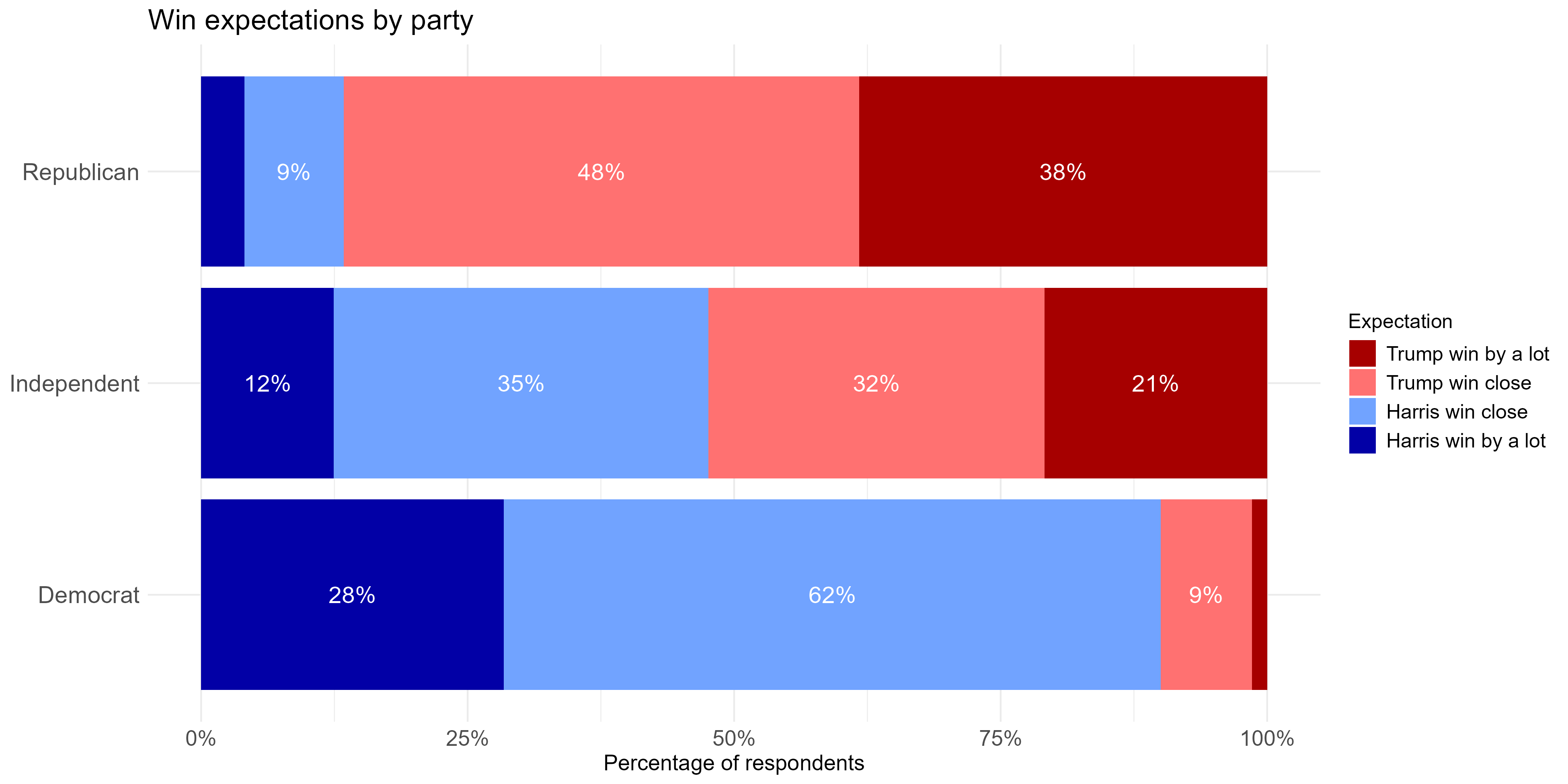
Within these groups, almost 2 in 5 Republicans and more than 1 in 4 Democrats expect their candidate to win by “quite a bit” (38% and 28%, respectively). A substantial share of the electorate is thus likely to be surprised by the outcome, which is expected to be close. These partisans may be especially vulnerable to claims of election malfeasance if the outcome differs from their expectations.
Campaign strategies
We asked our expert sample to rate how effective they think each of the following campaign strategies would be in helping either Harris or Trump win the general election on a four-point scale from “Not at all effective” to “Extremely effective”:
- Emphasizing threats to democracy posed by the other candidate
- Focusing on policy disagreements with the other candidate
- Highlighting divisions within the opposing party
- Emphasizing positive achievements by the party’s own candidate
- Encouraging higher voter turnout by supporters of the party’s candidate
- Endorsements of the candidate by current or former members of the other candidate’s party
The figure below shows the percentage of expert respondents who rated each strategy as very or extremely effective for each candidate.
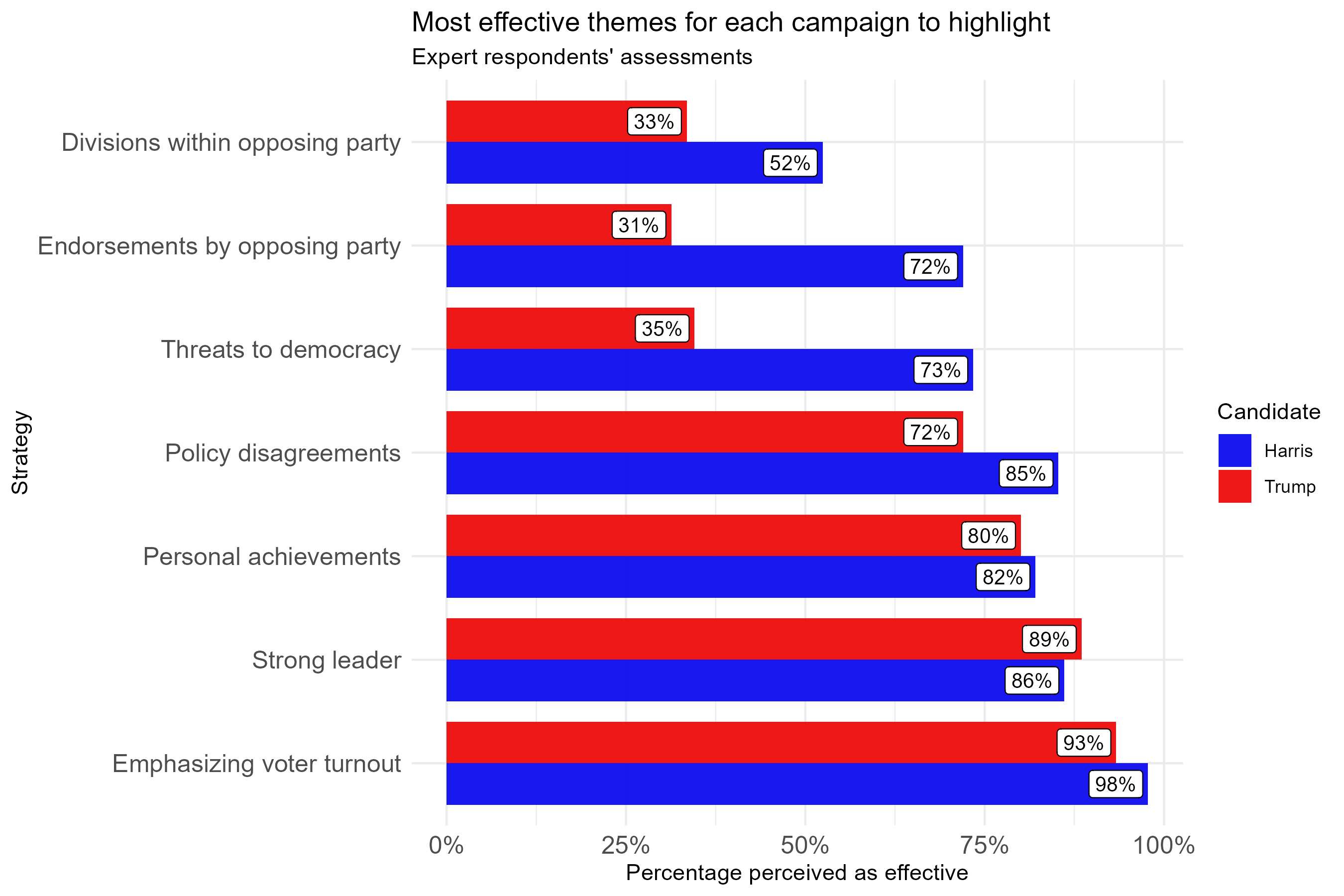
In general, experts have similar expectations about the effectiveness of strategies across the two campaigns. There is a notable consensus that mobilizing turnout, emphasizing the candidate’s leadership qualities and personal achievements, and highlighting policy disagreements with the other side are all effective approaches (ranging from 72–98% across candidates). Notably, however, a majority of experts think that it would also be effective for the Harris campaign to portray Donald Trump as a threat to democracy (73%) and to highlight divisions within the Republican Party and endorsements from Republican figures such as Liz Cheney and Adam Kinzinger (52% and 72%, respectively). They do not expect analogous efforts by Trump to be effective (35%, 34%, and 31%, respectively) notwithstanding prominent divisions within the Democratic party on the war in Gaza and the defection of former Democrats such as Robert F. Kennedy Jr. and Tulsi Gabbard to Trump.
We also conducted an experiment to assess whether endorsements of Harris by Republicans affect their vote intentions. To date, Harris has been endorsed by former Vice President Dick Cheney, as well as former House Republican Conference chair Liz Cheney and former House member Adam Kinzinger, the two GOP members on the House January 6 committee. All three have endorsed Harris, citing the threat that a second Trump term poses to American democracy.
We randomly assigned half of the respondents who said they intend to vote in November to read a news article adapted from two recent articles describing these endorsements (the other half were not shown anything):
Former Vice President Dick Cheney said Friday that he will vote for Democrat Kamala Harris over fellow Republican Donald Trump in the November election, warning that the former president “can never be trusted with power again.” Cheney and his daughter, former Wyoming Rep. Liz Cheney, are the most prominent Republicans to back Harris. Harris also has endorsements from former Rep. Adam Kinzinger, R‑Ill., and hundreds of local Republican officials.
Controlling for prior vote intention, we find that exposure to the Republican endorsements increased intention to vote for Harris by approximately 1 percentage point, an effect that did not measurably differ by party. This small effect is consistent with what has been found in experimental studies of political advertising.
Campaign misperceptions
We also sought to assess the accuracy of public beliefs about salient topics that have been raised during the 2024 campaign. Participants were asked to rate the accuracy of the statements below on a four-point scale from “Not at all accurate” to “Very accurate.”
Accurate statements:
- Donald Trump was photographed giving a thumbs-up and smiling while posing next to the graves of fallen Marines in Arlington National Cemetery.
- Kamala Harris supported banning fracking when she ran for president in 2020 but no longer supports such a ban.
- The July 13 assassination attempt on Donald Trump in Pennsylvania was carried out by a single person acting alone.
- The September 15 assassination attempt on Donald Trump in Florida was carried out by a single person acting alone.
Inaccurate statements:
- J.D. Vance wrote in his bestselling memoir, “Hillbilly Elegy,” about having a sexual encounter with a couch.
- Kamala Harris is ineligible to serve as president because she is not an American citizen.
- The July 13 assassination attempt on Donald Trump in Pennsylvania was staged.
- The September 15 assassination attempt on Donald Trump in Florida was staged.
- Democrats are trying to win the 2024 election by allowing unauthorized immigrants into the country and giving them the right to vote.
The figure below shows how endorsements of accurate (left panel) and inaccurate statements (right panel) vary by partisanship.
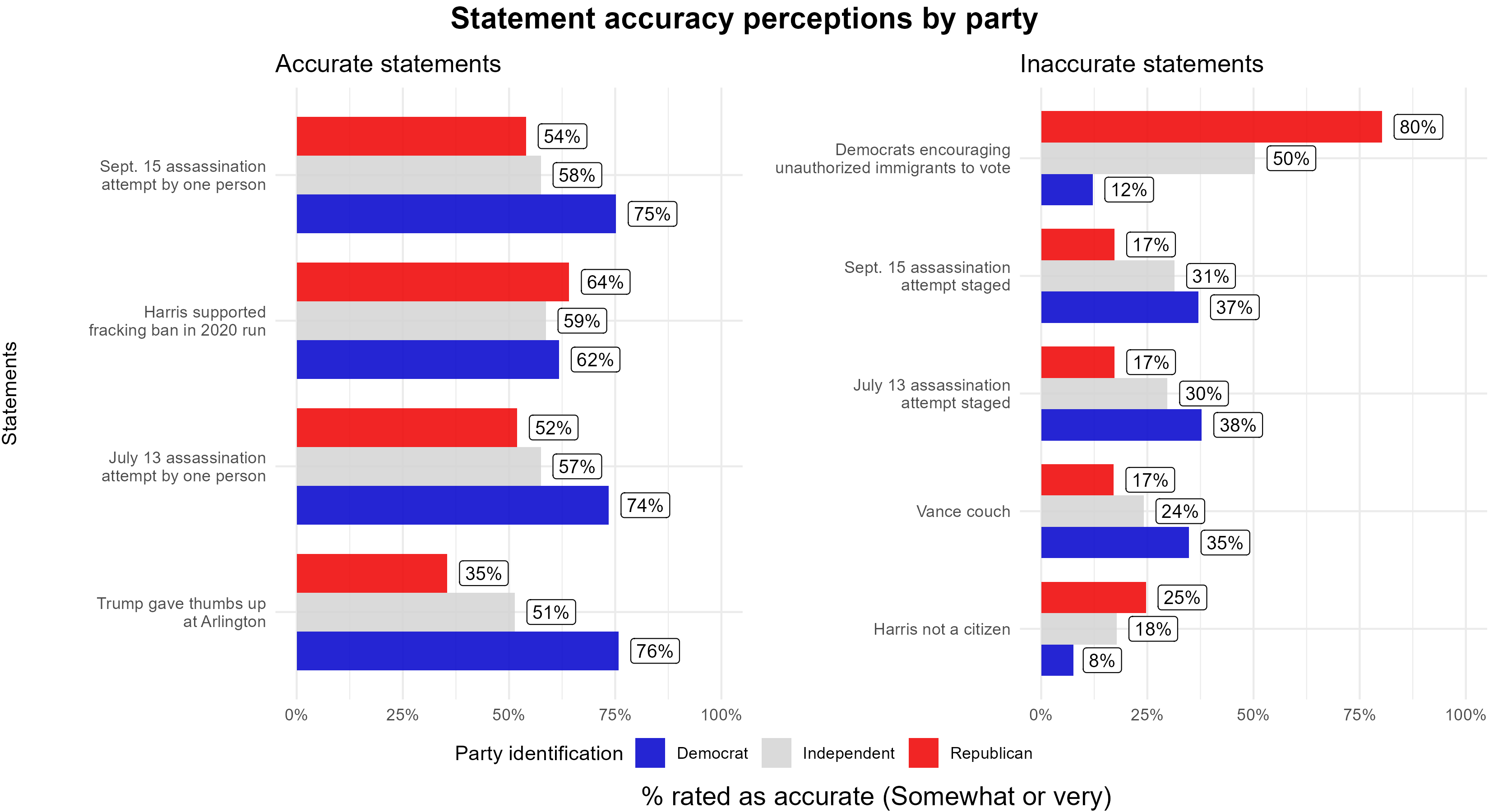
Unsurprisingly, the accuracy of people’s beliefs about these controversial claims varies by party. Among the accurate statements, Harris’s support for a fracking ban is recognized by majorities of Republicans (64%), Democrats (62%), and independents (59%), all of whom correctly identify that statement as accurate. However, Republicans score highest, which is consistent with her prior position being used in attacks on Harris. By contrast, Democrats (76%) were far more apt to identify the statement about Trump’s widely criticized thumbs up picture at Arlington National Cemetery as accurate than were Republicans (35%; independents fell between at 51%).
Partisan splits on the inaccurate statements in our survey are more pronounced than for accurate statements. 8 in 10 Republicans endorse the false claim promoted by Donald Trump and his allies that Democrats are trying to win the 2024 election by allowing unauthorized immigrants into the country and giving them the right to vote — a view shared by 50% of independents but only 12% of Democrats. Unlike in the Obama years, however, only 25% of Republicans falsely believe Vice President Harris is not a U.S. citizen and is therefore ineligible to serve as president (as well as 18% of independents and 8% of Democrats).
When inaccurate statements are unflattering to Republicans, Democrats are more amenable to sign on. 35% of Democrats — in contrast to 17% of Republicans and 24% of independents — endorse the debunked rumor that GOP vice presidential candidate J.D. Vance’s memoir includes an account of a sexual encounter with a couch. (These results are similar when we exclude people who admit to sometimes “providing humorous or insincere responses to questions” — see Appendix below.)
A more serious concern is that substantial numbers of Democrats endorsed the idea that the July (38%) and September (37%) assassination attempts on Trump were staged rather than real, as did smaller numbers of independents and Republicans. However, majorities across the partisan spectrum (ranging from 52% to 75%) stated that the assassination attempts were lone wolf attacks.
In combination, we find that fewer than 50% of all respondents hold the accurate belief that each attempt was carried out by a single person and not staged (47% for the July attempt, 48% for September). Almost four in ten Americans, by contrast, think that more than one person was involved in a real attempt to kill Trump (26% for each attempt) or that the event was staged by multiple people (12% for July, 11% for September). Finally, for each event, 15% of respondents hold the seemingly incoherent view that the event was carried out by a single actor, but that the attempt was staged.
The figure below shows how characterizations of the July 13 assassination attempt on former President Donald Trump vary by partisanship.
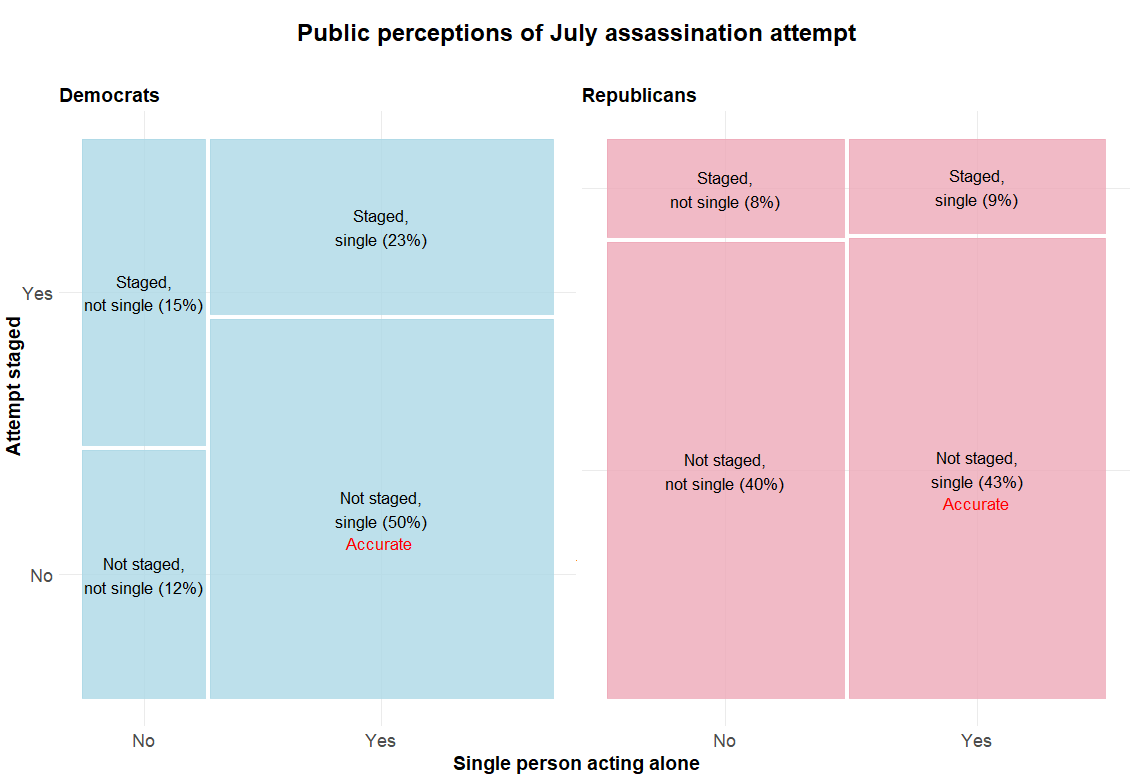
When we disaggregate these beliefs by party, we see notable differences in conspiratorial beliefs about the assassinations by party. Republicans are more likely to believe that multiple people were involved in a genuine assassination attempt in July (40%), whereas Democrats are more likely to say the assassination was staged, though they divide over whether one person (23%) or many (15%) were involved. (See the Appendix for perceptions of the September attempt, which are very similar.)
Incitement experiment
Political leaders can foster misperceptions about opposition partisans that inspire hate or worse. After the assassination attempts against former president Trump this summer, for instance, both Trump and his running mate J.D. Vance suggested that Democrats were responsible for the assassination attempts. We randomly exposed half of the participants in our public survey to the following passage quoting Vance and Trump:
After a second assassination attempt against Donald Trump, his vice presidential running mate J.D. Vance said, “If you tell the American people that this person is the end of democracy, if you tell the American people that this person needs to be eliminated, most of them, thank God, are going to ignore you. But some crazy person is going to take matters into their own hands and actually listen to the crazy rhetoric that you’re putting out there.” Trump later made a similar statement to Fox News Digital, saying that the gunman “believed the rhetoric of Biden and Harris, and he acted on it. Their rhetoric is causing me to be shot at.”
We then asked all participants to rate the accuracy of the following statement: “The Democratic Party encouraged or incited the attempt to assassinate Donald Trump.” We find that the statements by Trump and Vance did not measurably affect endorsement of the statement overall or for any partisan group. However, 69% of Republicans said it was somewhat or very accurate compared to 38% of independents and 9% of Democrats.
Public confidence in elections
As in prior surveys, we asked respondents to report their confidence that their own vote, votes in their state, and votes nationwide in that election will be counted as voters intend. We also asked people how confident they are that election administrators nationwide will count votes fairly and accurately in the presidential election and that everyone who is legally entitled to vote and seeks to do so will be able to cast a ballot in November. The figure below reports how many people are very or somewhat confident in each of these aspects of the 2024 election by party.
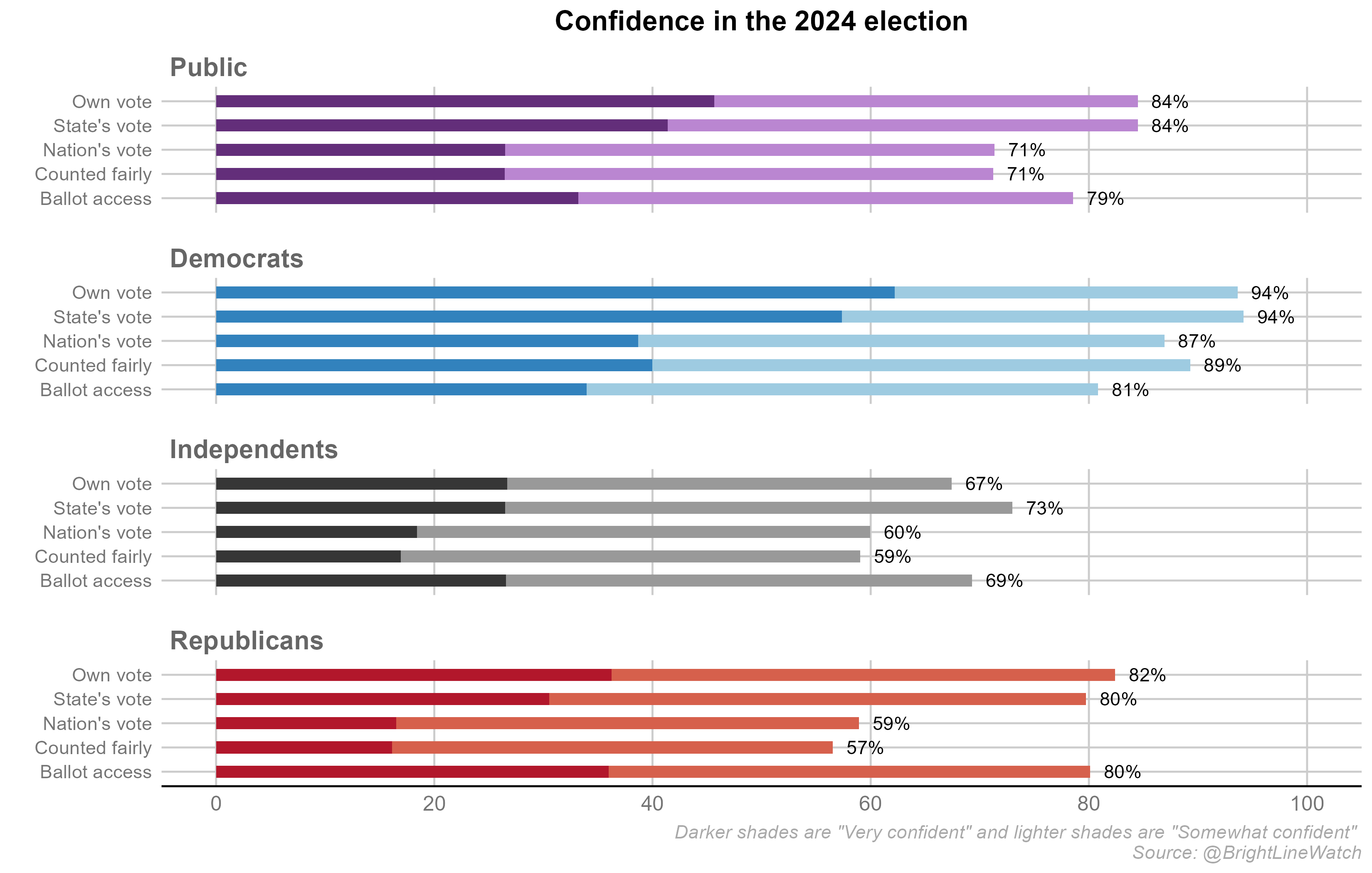
For each set of respondents, the first three bars show confidence in the vote count for one’s own vote, votes in one’s state, and votes nationwide. As in previous surveys, we observe a substantial decrease in public confidence in the vote count as we move from their own vote (84%) and the state level (84%) to the national level (71%). Among Democrats, confidence declines only slightly across these levels (94% own vote, 94% state vote, 87% national vote). The shift is driven instead by Republicans and independents. For both groups, confidence at the state level is nearly as high as for one’s own vote (80% and 82% for Republicans, 73% and 67% for independents), but drops off sharply at the national level to 57% and 59%, respectively. Confidence in the national vote count closely corresponds to trust in election administrators for each partisan group (within two percentage points in each case). We also note that the confidence gap between the national vote and state and local counts is even greater among Republicans than it was in October 2022 (49% nationally versus 67% for the state vote and 68% for one’s own vote), though reported confidence levels are higher today.
Finally, ballot access perceptions are less polarized. Eight in ten Americans — including 81% of Democrats, 80% of Republicans, and 69% of independents — are very or somewhat confident that everyone who is legally entitled to vote will be able to do so.
For nearly four years, we have been asking Americans whether Joe Biden was the rightful winner of the 2020 presidential election. The figure below shows the share of respondents across different partisan groups who state that Biden was “definitely” or “probably” the rightful winner in each survey. In addition to showing Democrats, independents, and Republicans, we specifically differentiate between Republicans who say they are more of a supporter of Trump and those who say they are more of a supporter of the Republican Party (now 58% of GOP identifiers versus 42%; see Appendix).

The public’s views on this question have been starkly polarized for years. Since November 2020, only minorities (25%-38%) of Republicans have acknowledged Biden’s victory — a vast difference from Democrats, who have overwhelmingly affirmed the outcome as legitimate (94%-97%). Partisan independents have fallen in the middle, varying from 57% to 68%. After a period of stasis, we observed an uptick in Republican acceptance of Biden’s win in late 2022 to a new equilibrium of 35%-36%. Interestingly, despite the continued insistence by Trump and his surrogates that he won in 2020, 38% of Republicans now say Biden was the rightful winner in 2020 (versus 33% in October 2022), including 23% of those who say they are more of a Trump supporter (previously 16%) and 57% of those who say they are more of a supporter of the Republican Party (previously 49%). These changes may reflect a reduction in Republican animus toward Biden after his withdrawal from the presidential race.
In light of the unusual process by which Harris replaced Biden, we also asked Americans whether they see Harris as the rightful nominee. For comparison, we also asked whether respondents regard Trump as the rightful Republican nominee. The responses, broken out by partisanship, are below.
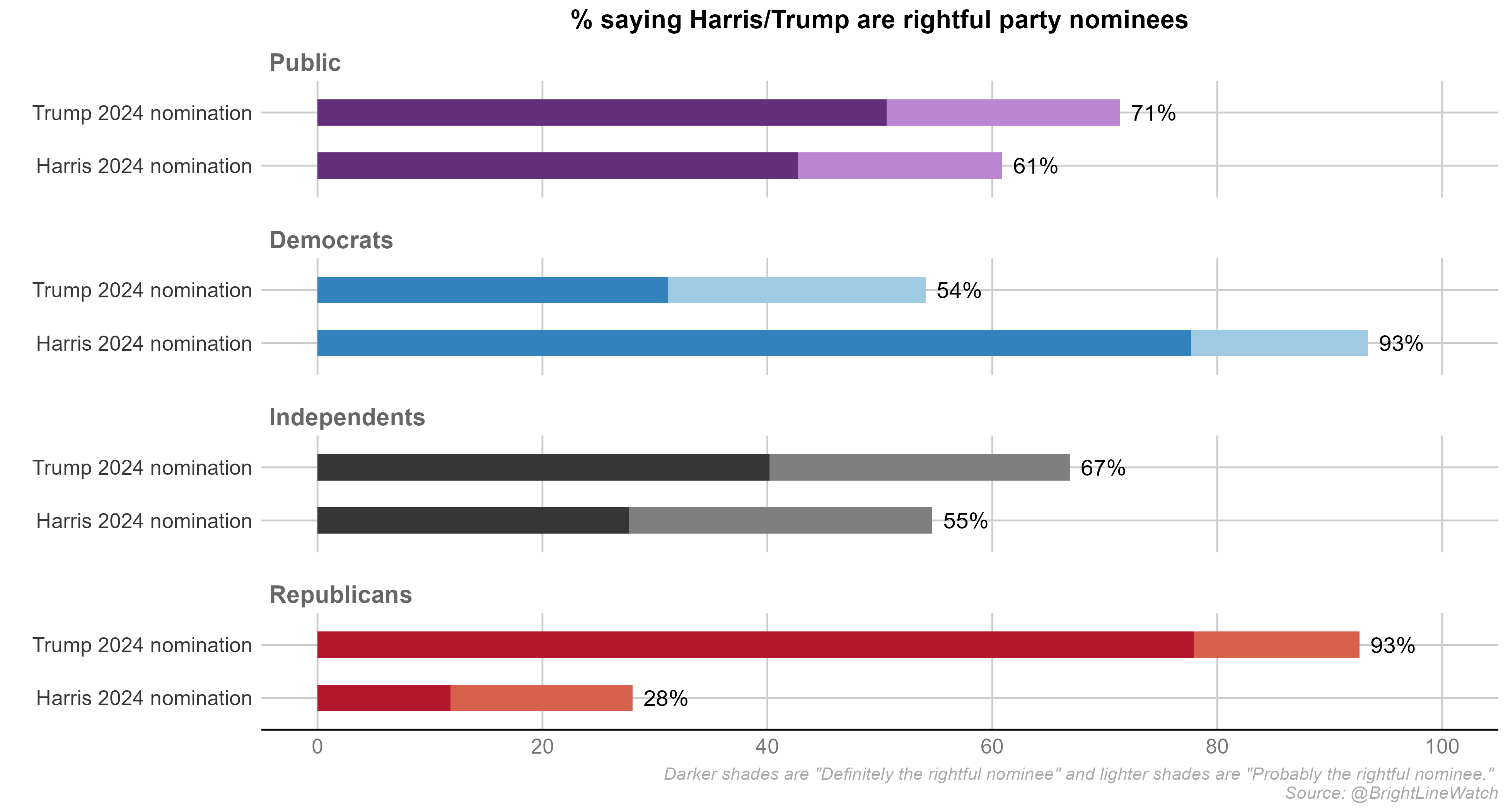
The public sees the Trump nomination (71%) as more legitimate than that of Harris (61%) — a pattern that is reflected in the attitudes of independents (67% and 55%, respectively). Among partisans, the breakdowns show a familiar polarization, with Democrats overwhelmingly (93%) embracing Harris’s nomination as rightful and Republicans largely refusing to do so (28%). Trump’s nomination is endorsed by nearly all Republicans (93%) as well. Unlike Republicans with Harris, Democrats endorse the legitimacy of Trump’s nomination, but only narrowly (53%).
We asked Americans how important it is “for a losing candidate to publicly acknowledge the winner as the legitimate holder of the office” both in presidential elections and in races for Congress or statewide office. The figure below breaks out the percentage of respondents saying it is very or somewhat important for the loser to concede by partisanship and office (diamonds for the presidential race, circles for Congress or statewide office).
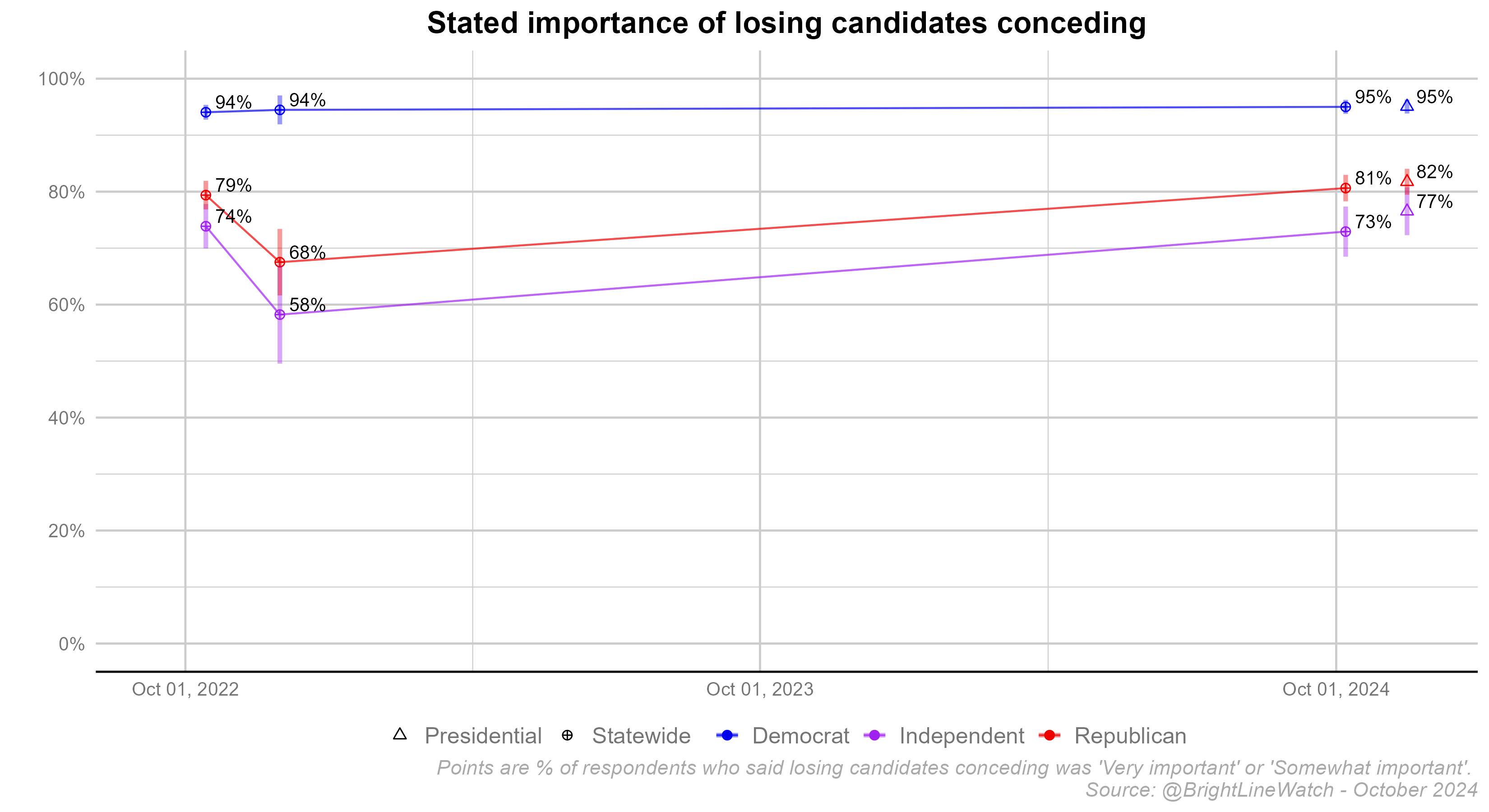
Democrats are nearly unanimous on the importance of losing candidates conceding for all offices (94%-95%). For statewide or congressional candidates, Republicans and independents were less likely to say concessions are important before the 2022 midterm elections (79% and 74%, respectively). Those levels dropped to 68% and 58%, respectively, after the elections in November 2022, but rebounded to 81% for Republicans and 73% for independents in our October 2024 survey. We also asked a new question specifically about the importance of a losing presidential candidate conceding. The results mirror the importance expressed for congressional and statewide office candidates.
While these results might seem encouraging, a recent Pew survey shows that preferences toward concessions vary by outcome and candidate preference. Among Trump supporters, 77% say it’s important for Harris to concede if Trump wins, but only 59% say it’s important for Trump to concede if Harris wins. No such asymmetry exists among Harris supporters — 87% say it is important for Trump to concede if he loses versus 86% who say the same for Harris if she loses. Given our findings above that most partisans expect their party’s candidate to win, many Americans may be answering broad questions about the importance of concessions with the expectation that it is the other candidate who should concede.
Beliefs in voter and election fraud
We asked respondents about the prevalence of six different forms of voter and election fraud: voting by non-citizens, voting under a false identity, stealing or tampering with ballots, voting more than once, voting with another person’s absentee ballot, and changing votes by manipulating voting machine software. For each type of fraud, respondents were asked how many times it took place on a seven-point scale from “Never” to “A million or more.” The figure below compares current public beliefs in the prevalence of fraud in the 2024 election with beliefs in the prevalence of fraud in the 2020 and 2022 elections from pre- and post-election surveys conducted in November 2020, and a post-election survey from 2022. (We intend to repeat this battery in a post-election survey this November as well.) For each election and for each type of fraud, the figure shows the percentages of Democrats, Republicans, and independents who estimated that thousands of votes or more were affected in 2020 and 2022 or will be affected in 2024. 2
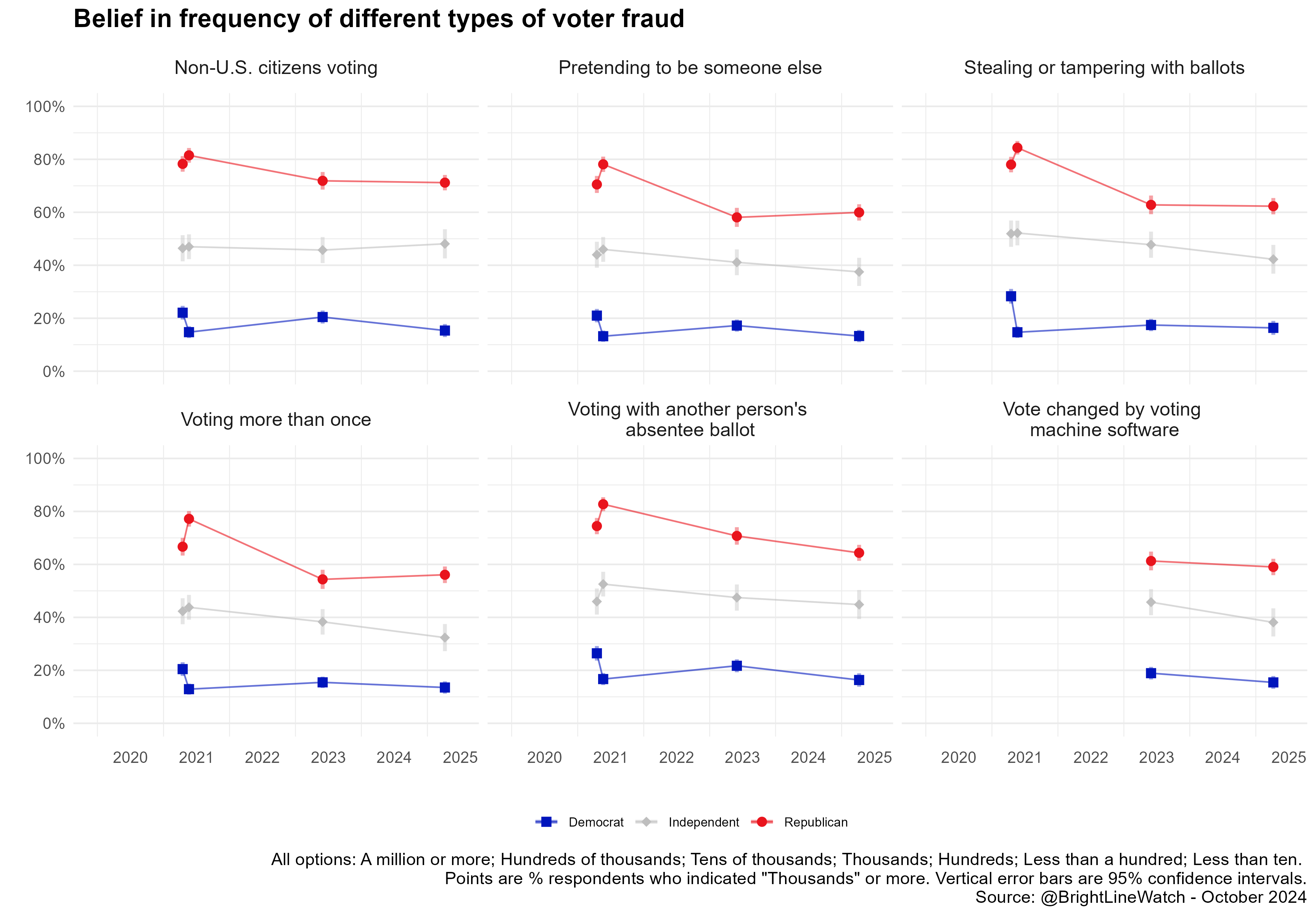
The public’s beliefs about the prevalence of fraud are wildly exaggerated. There is no credible evidence of “thousands” of cases of any of these types of fraud. Contrary to the claims of Trump and his surrogate, scholars find election fraud incidence to be vanishingly rare in general, including in the 2020 election. In this sense, even the beliefs of many Democrats are out of line with empirical evidence. Republican beliefs are even further removed from any empirical support. However, we also note that beliefs about the prevalence of fraud have generally trended downward since 2020.
Candidate age limit
Since the 22nd Amendment limited presidents to two terms in 1947, only one incumbent who was constitutionally eligible to run declined to do so (Lyndon B. Johnson in 1968). In July 2024, Joe Biden became the second eligible incumbent to forgo a re-election campaign after his stumbling performance in a June debate with Trump prompted panic among Democrats about his age and competence. In the aftermath of these events, we asked both experts and the public whether they would support or oppose imposing a maximum age for candidates to be eligible to run for president. The figure below shows the results, with responses among the public also broken out by partisanship.
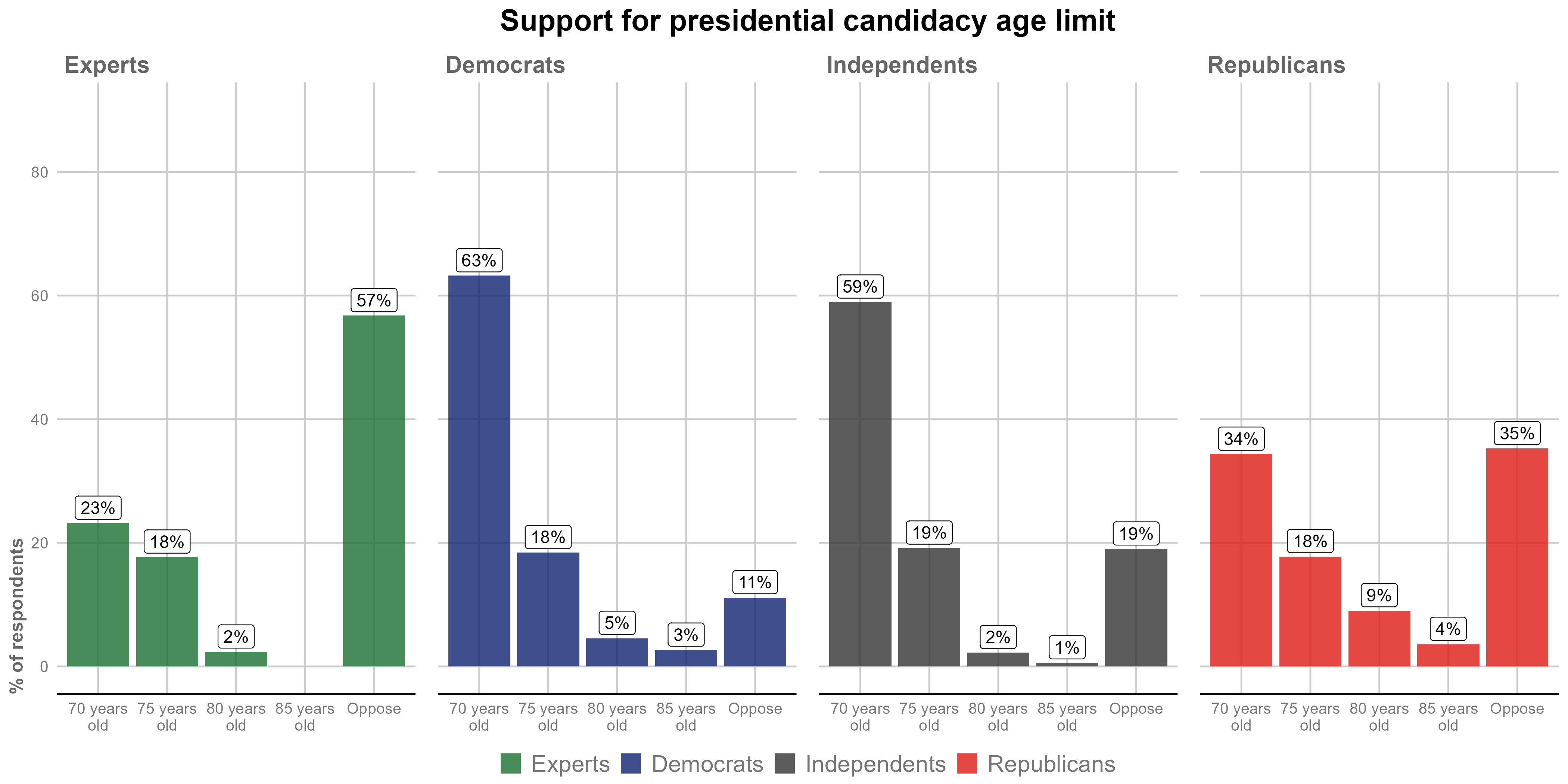
Overall, experts are far more negative toward this proposal than the public, with 57% opposing any age limit. By contrast, 78% of the public endorses an age limit compared to 61% in a Sept. 2023 Quinnipiac University poll. Moreover, each partisan group favors an age limit — 89% of Democrats (up from 60% last year), 81% of independents (up from 66%), and 65% of Republicans (up from 57% last year). The most popular age limit is 70 years old, the most restrictive option offered, which would have prevented Joe Biden from running for the presidency in 2020 or 2024, Donald Trump from running in 2016, 2020, and 2024, and Ronald Reagan from running in 1984. Such a limit is supported by 63% of Democrats, 59% of independents, and 34% of Republicans.
Threats to democracy
We asked our experts to assess the impact of a series of recent events on democracy in the U.S. Respondents were first asked whether the event would benefit, threaten, or not affect American democracy. Those who selected benefit or threat were then asked about the extent of such an effect. The set of events that experts were asked to consider was the following:
- The Democratic Party nominates Vice President Kamala Harris to replace Joe Biden without a primary process.
- The Supreme Court rules that the president has “absolute immunity from criminal prosecution for actions within his conclusive and preclusive constitutional authority” and “at least presumptive immunity from prosecution” for all official acts.
- The Georgia State Election Board approves new rules that require county election officials to make a “reasonable inquiry” before certifying election results to the state.
- Donald Trump named J.D. Vance as his vice presidential running mate.
- Kamala Harris named Tim Walz as her vice presidential running mate.
- Judge Juan Merchan delayed sentencing until after the election in Donald Trump’s New York trial involving the falsification of business records related to hush money payments to an adult film actress.
- Judge Tanya Chutkan announced that pretrial proceedings would resume before the election in the trial of Donald Trump for his efforts to overturn the results of the 2020 presidential election and role in the events leading up to the January 6 Capitol attack.
The left panel of the figure below shows expert ratings of the perceived benefits and threats to democracy from these events in descending order based on their overall perceived threat to democracy. (The right panel shows the percentage of respondents who rated the scenario as neither a threat nor a benefit to democracy.)
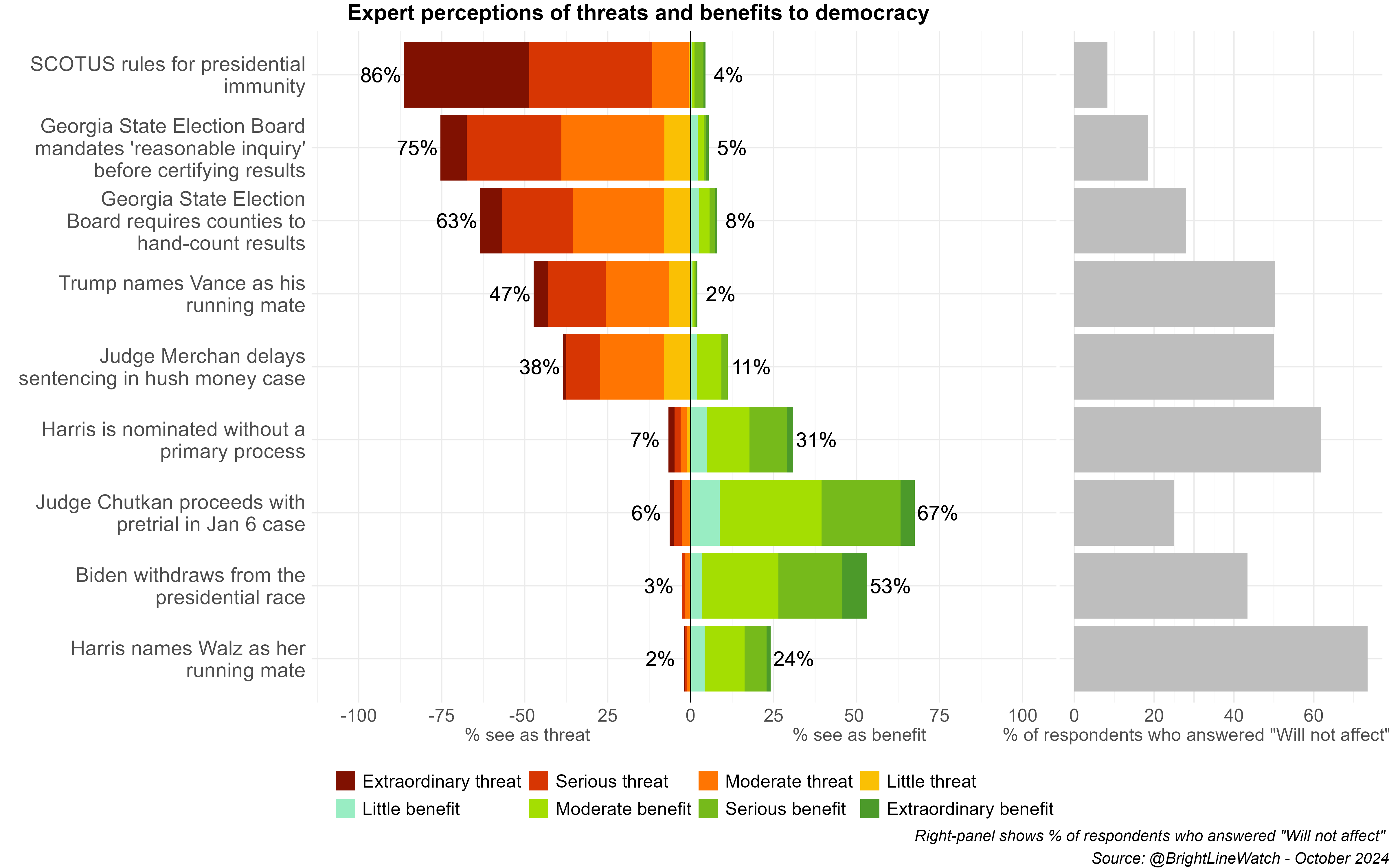
Experts rate the Supreme Court’s July ruling establishing broad presidential immunity from criminal prosecution as the most significant threat to democracy among the events listed. In total, 86% rate it as a threat to democracy, including 75% who view it as either a serious or extraordinary threat. Relatedly, when we asked experts to rate the performance of American democracy in a variety of domains, we observed a significant decline since June only in the share of experts who say the U.S. mostly or fully meets the standard that the judiciary is able to effectively limit executive power. The percentage of experts who say the judiciary effectively limits executive power declined from 65% in June (before the Court’s decision) to 43% in this most recent survey (see figure in Appendix below).
Majorities of experts were also concerned by recent decisions by the Georgia State Election Board to require county election boards to conduct a “reasonable inquiry” before certifying election results and to require precinct election officials to hand count ballots and to compare hand count totals with machine counts (75% and 63%, respectively). Both changes threaten to delay the certification of results and to foster unfounded doubts about election integrity. Fewer than half of experts rated Trump’s nomination of J.D. Vance as his running mate or the delay in Trump’s sentencing in New York as a threat to democracy (47% and 38%, respectively).
Conversely, 67% of the experts regarded Judge Tanya Chutkan’s decision to proceed with pretrial motions in Special Counsel Jack Smith’s prosecution of Trump for his actions around the January 6, 2021 attack on the U.S. Capitol as beneficial to democracy. 53% rated Biden’s withdrawal from the presidential race as a benefit to democracy. Finally, smaller shares regarded Kamala Harris’s nomination without a primary process and her subsequent naming Tim Walz as her running mate as beneficial as well (31% and 24%, respectively).
Assessment of potential future events
We also asked our expert sample to rate the probability of future events that have consequences for American democracy in the coming months:
- Another assassination attempt is made against one of the two major presidential candidates or one or more arrests are made in another assassination plot.
- Former President Trump declares victory before the Associated Press calls the race.
- Vice President Harris declares victory before the Associated Press calls the race.
- Kamala Harris is declared the winner of the election by the Associated Press.
- Donald Trump is declared the winner of the election by the Associated Press.
- Donald Trump is sworn into office as president on January 20, 2025.
- Kamala Harris is sworn into office as president on January 20, 2025.
- Former President Trump attacks the “blue shift” toward Democrats as mail votes are counted, insisting that the initial totals on Election Night were correct.
- Former President Trump makes statements or posts tweets encouraging violence and intimidation during voting or ballot counting.
- The Vice President and the Speaker of the House publicly disagree on the legitimacy or certification of the Electoral College results following the 2024 election.
- A conflict over Electoral College votes causes the appointment of an acting president under the terms of the Twentieth Amendment on January 20, 2025.
- A faithless elector decides the presidency.
- The presidential election is decided by the House of Representatives.
- A state legislature names electors to the Electoral College other than those designated by the popular vote in that state.
- One or more candidates who lose elections for statewide office (for example, governor or U.S senator) refuse to concede defeat.
- Disputes over the election results escalate to political violence in which more than 10 people are killed nationwide.
- The winner of the presidential race is not known by November 6, the day after the election.
- At least one county or state election board in a swing state (AZ, GA, MI, NC, NV, PA, WI) refuses to certify election results that are viewed as legitimate by experts.
- State or federal courts must compel the certification of election results in one or more swing states (AZ, GA, MI, NC, NV, PA, WI).
- Foreign hackers cripple voter registration and election systems in one or more states.
- An unusually large number of provisional, mail-in, or absentee ballots are rejected in a swing state, potentially changing the outcome of the election.
- Kamala Harris refuses to concede defeat within 24 hours.
- Donald Trump refuses to concede defeat within 24 hours.
The figure below reports the median estimate and the distribution of estimates for each scenario among our expert respondents on a 0–100% scale. Items are listed in descending order of estimated median probability.
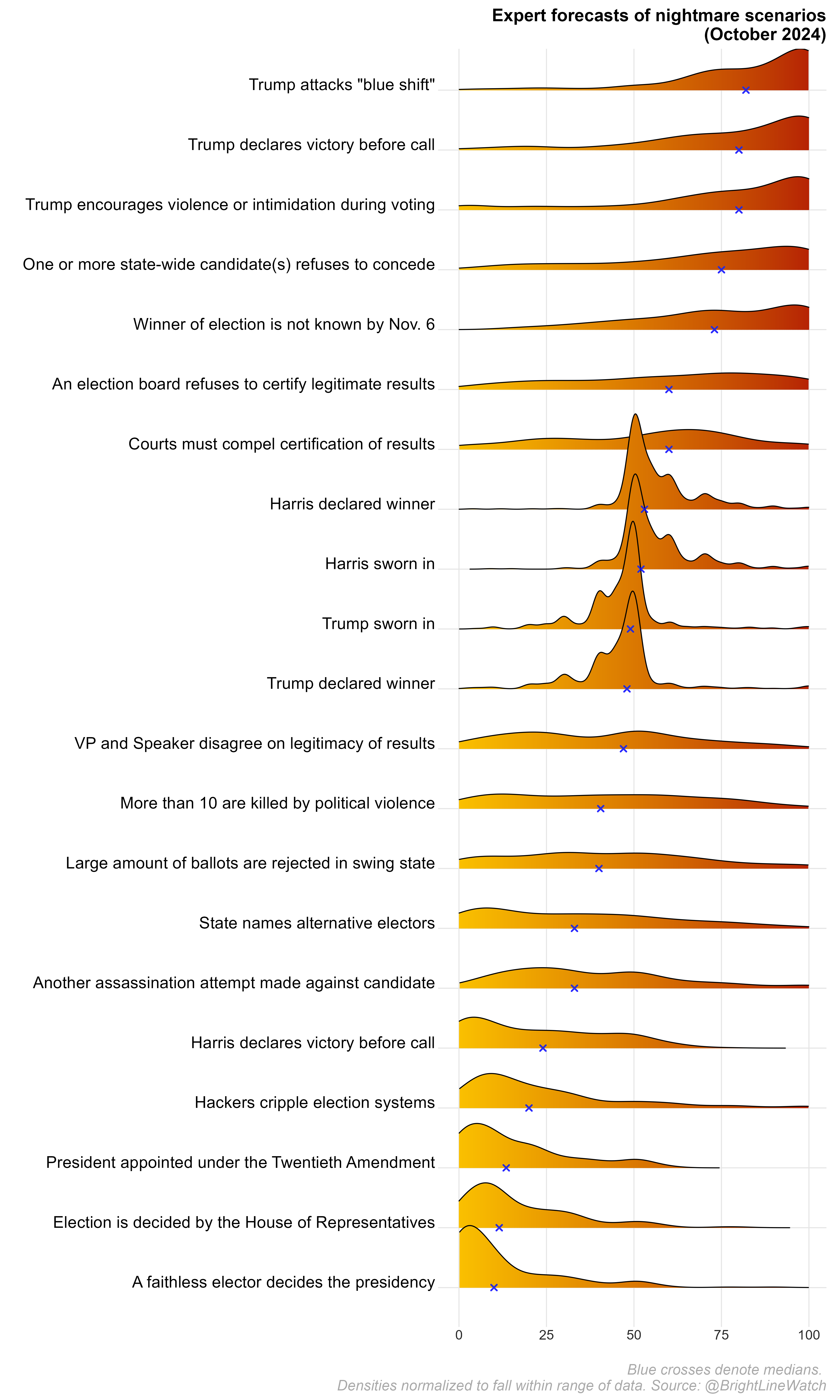
The potential events experts see as most likely all concern Donald Trump’s actions around Election Day — asserting that his election-day vote share should stand if ballots counted later lean toward Harris (median forecast: 82%), encouraging violence and intimidation by his supporters (80%), and declaring victory before the Associated Press calls the race (80%). Relatedy, the experts also expect that the election winner will not be known by November 6, the day after Election Day (73%).
Other scenarios rated as more probable than not also concern efforts to deny or challenge election results: one or more losing candidate for statewide office refusing to concede defeat (75%), a county or statewide election board in one or more swing states refusing to certify election results (60%), and state or federal courts intervening to compel the certification of election results in one or more swing states (60%).
The median forecast exceeds one chance in three for Vice President Harris and House Speaker Mike Johnson clashing over the legitimacy of the election result (47%), more than ten people being killed in election-related political violence (40%), large numbers of ballots being rejected in at least one swing state (40%), at least one state legislature submitting a slate of electors other than those designated by the popular vote in that state (33%), and another assassination attempt being made against a presidential candidate (33%).
Events that were seen as less likely include Harris declaring victory before the race is called (24%), hackers crippling election software (20%), or various constitutional idiosyncrasies determining the presidential outcome: the appointment of an acting president under the terms of the Twentieth Amendment (14%) or the election being decided by the House of Representatives (12%) or by the vote of a faithless elector (10%).
We also asked about two scenarios that are conditional on specific outcomes in the presidential election — the probability that Trump refuses to concede within 24 hours if Harris is declared the election winner by the Associated Press, and the probability that Harris refuses to concede within 24 hours if Trump is declared the winner. We contrast these results with Pew polling asking Americans if each candidate will concede if the other is declared the winner. For Harris, 75% of experts and 72% of the public think she will concede if she loses the election. By contrast, just 7% of experts and 24% of the public think Trump will concede if he loses.
Finally, we asked our experts to rate the probability both that Harris is declared the winner (53%) versus Trump (48%) and the corresponding probabilities of Harris being sworn in as president (52%) and Trump (49%). From these estimates, we estimate that experts assign a median probability of 0% to Trump overturning the election result assuming Harris is declared the winner.
Ratings of the state of U.S. democracy
As in each Bright Line Watch survey, we asked both expert and public respondents to rate the overall performance of U.S. democracy on a 0–100 scale. In September 2024, the average expert rating was 70. The public overall is consistently less sanguine than our experts, with an average rating of 57. Democrats rate American democracy somewhat higher (63) whereas Republicans put it a bit lower (54).
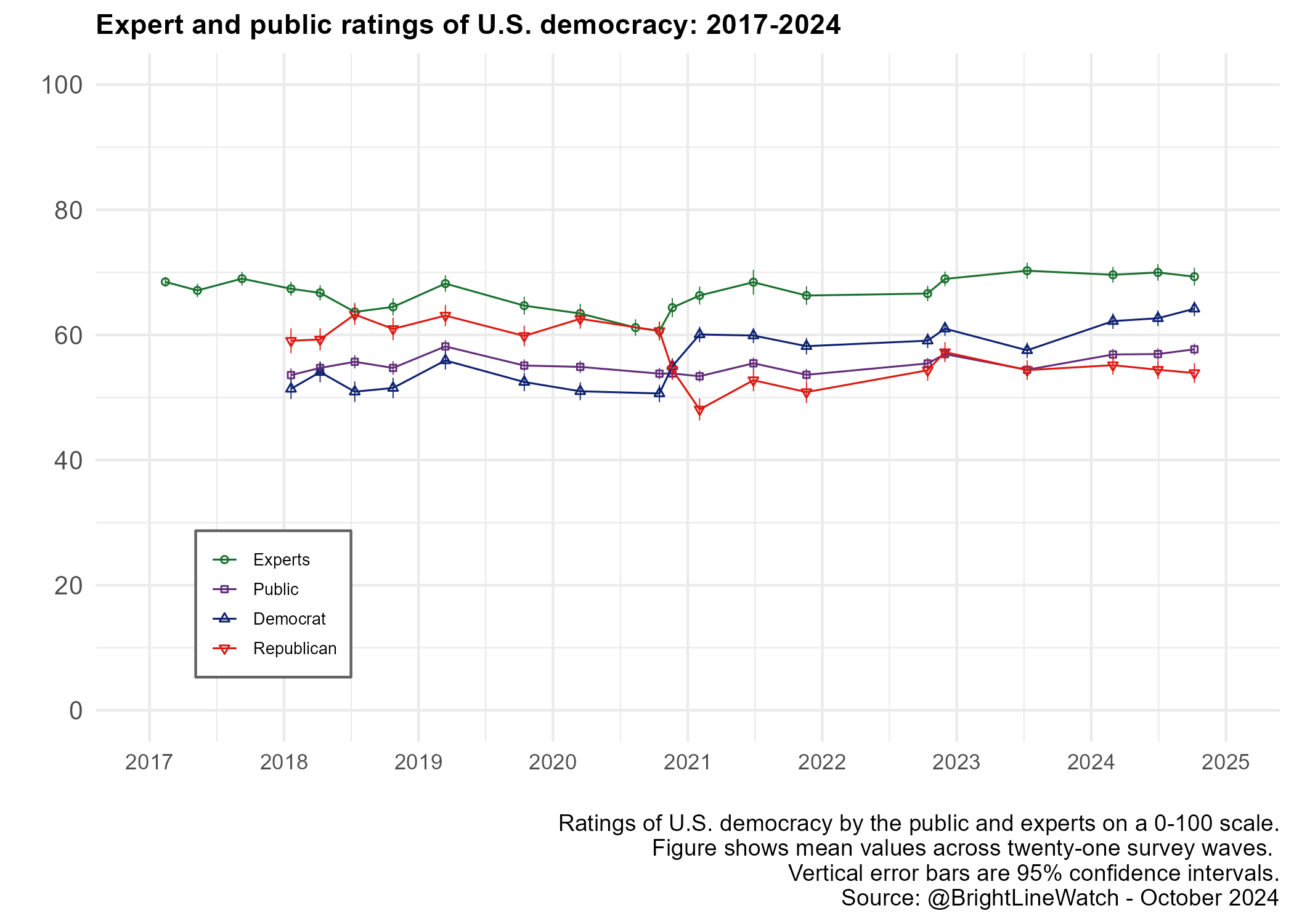
Finally, the September survey asked expert and public participants to separately project the state of American democracy in 2027 on the same 0–100 scale assuming that either Harris or Trump wins the 2024 presidential election.
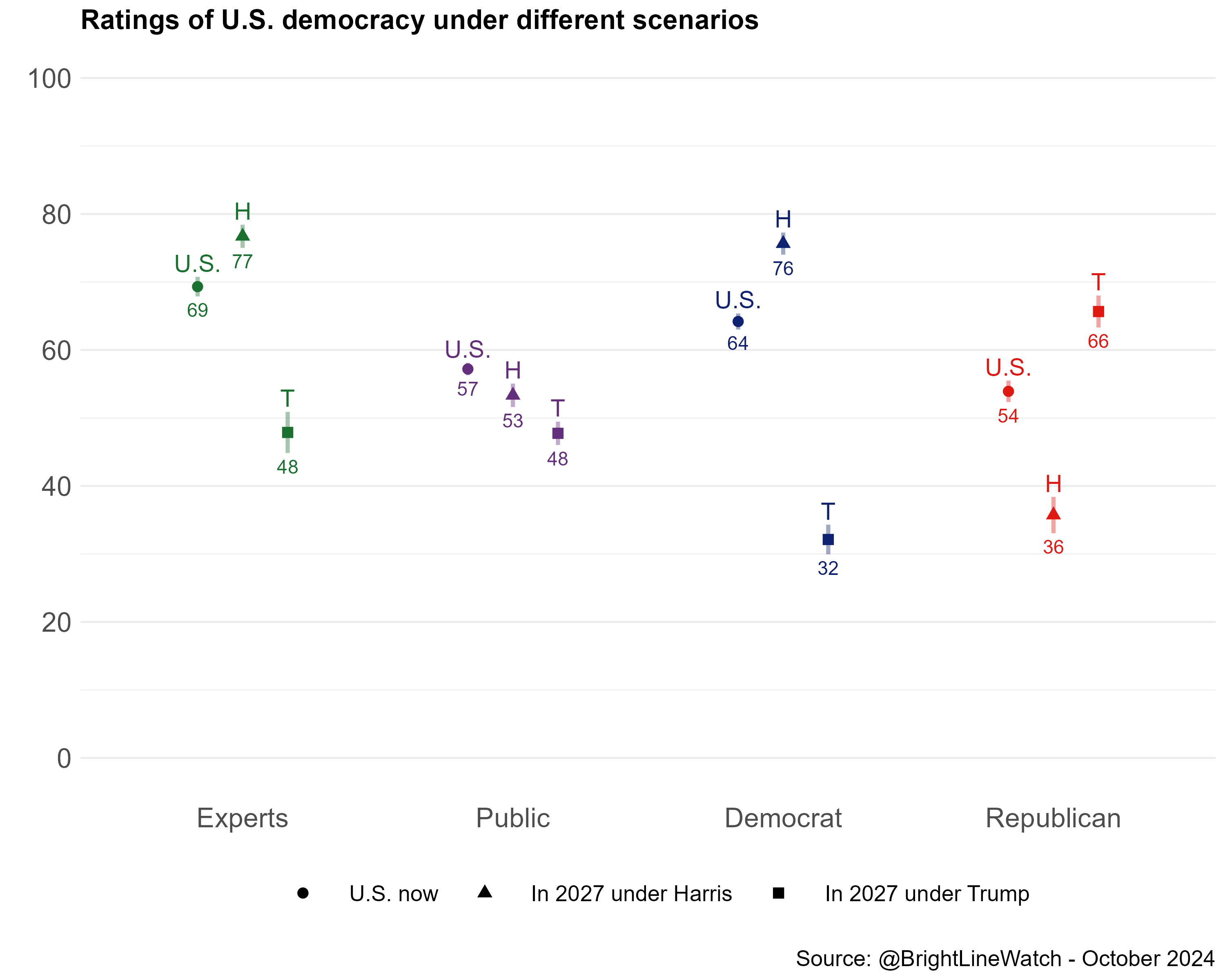
The experts anticipate improvement from 69 now to 77 in 2027 if Harris were elected, whereas they project a major decline to 48 by 2027 if Trump wins in November. The public, by contrast, projects a decline from 57 now to 53 if Harris wins and 48 if Trump wins. However, these projections diverge across the partisan divide. Democrats expect an increase from 64 now to 76 if Harris wins versus 32 if Trump wins, whereas Republicans expect an increase from 54 now to 66 if Trump wins and 36 if Harris wins.
Appendix
Bright Line Watch conducted its twenty-first survey of academic experts and its eighteenth survey of the general public from September 25–October 8, 2024. Our public sample consisted of 2750 participants from the YouGov panel who were selected and weighted to be representative of the U.S. adult population. We also surveyed 549 political science experts across a diverse range of subfields. Our email list was constructed from the faculty list of U.S. institutions represented in the online program of the 2016 American Political Science Association conference and updated by reviewing department websites and job placement records from Ph.D. programs in the period since.
All estimates shown in the report used weights provided by YouGov. Our expert sample is unweighted because we do not collect demographic data to protect anonymity. Error bars in our graphs represent 95% confidence intervals. Data are available here.
Both the expert and public samples in Wave 22 responded to a battery of questions about democratic performance in the United States. Afterward, they were asked to evaluate the quality of American democracy overall on a 100-point scale.
How well do the following statements describe the United States as of today?
- The U.S. does not meet this standard
- The U.S. partly meets this standard
- The U.S. mostly meets this standard
- The U.S fully meets this standard
- Government officials are legally sanctioned for misconduct
- Government officials do not use public office for private gain
- Government agencies are not used to monitor, attack, or punish political opponents
- All adult citizens enjoy the same legal and political rights
- Government does not interfere with journalists or news organizations
- Government effectively prevents private actors from engaging in politically-motivated violence or intimidation
- Government protects individuals’ right to engage in unpopular speech or expression
- Political competition occurs without criticism of opponents’ loyalty or patriotism
- Elections are free from foreign influence
- Parties and candidates are not barred due to their political beliefs and ideologies
- All adult citizens have equal opportunity to vote
- All votes have equal impact on election outcomes
- Elections are conducted, ballots counted, and winners determined without pervasive fraud or manipulation
- Executive authority cannot be expanded beyond constitutional limits
- The legislature is able to effectively limit executive power
- The judiciary is able to effectively limit executive power
- The elected branches respect judicial independence
- Voter participation in elections is generally high
- Information about the sources of campaign funding is available to the public
- Public policy is not determined by large campaign contributions
- Citizens can make their opinions heard in open debate about policies that are under consideration
- The geographic boundaries of electoral districts do not systematically advantage any particular political party
- Even when there are disagreements about ideology or policy, political leaders generally share a common understanding of relevant facts
- Elected officials seek compromise with political opponents
- Citizens have access to information about candidates that is relevant to how they would govern
- Government protects individuals’ right to engage in peaceful protest
- Law enforcement investigations of public officials or their associates are free from political influence or interference
- Government statistics and data are produced by experts who are not influenced by political considerations
- The law is enforced equally for all persons
- Politicians who lose free and fair elections publicly concede defeat
The figure below breaks out performance ratings on each of 30 democratic principles. The markers for each principle indicate the percentage of expert (green) and public (purple) respondents who regard the United States as fully or mostly meeting the standard (as opposed to meeting it partly or not at all). Consistent with the overall ratings, the experts rate U.S. democratic performance more positively than the public overall. Few exceptions exist, however, such as voting rights being equally protected for all citizens, politicians operating with a common understanding on factual matters, and electoral districts not systematically favoring one party over the other.
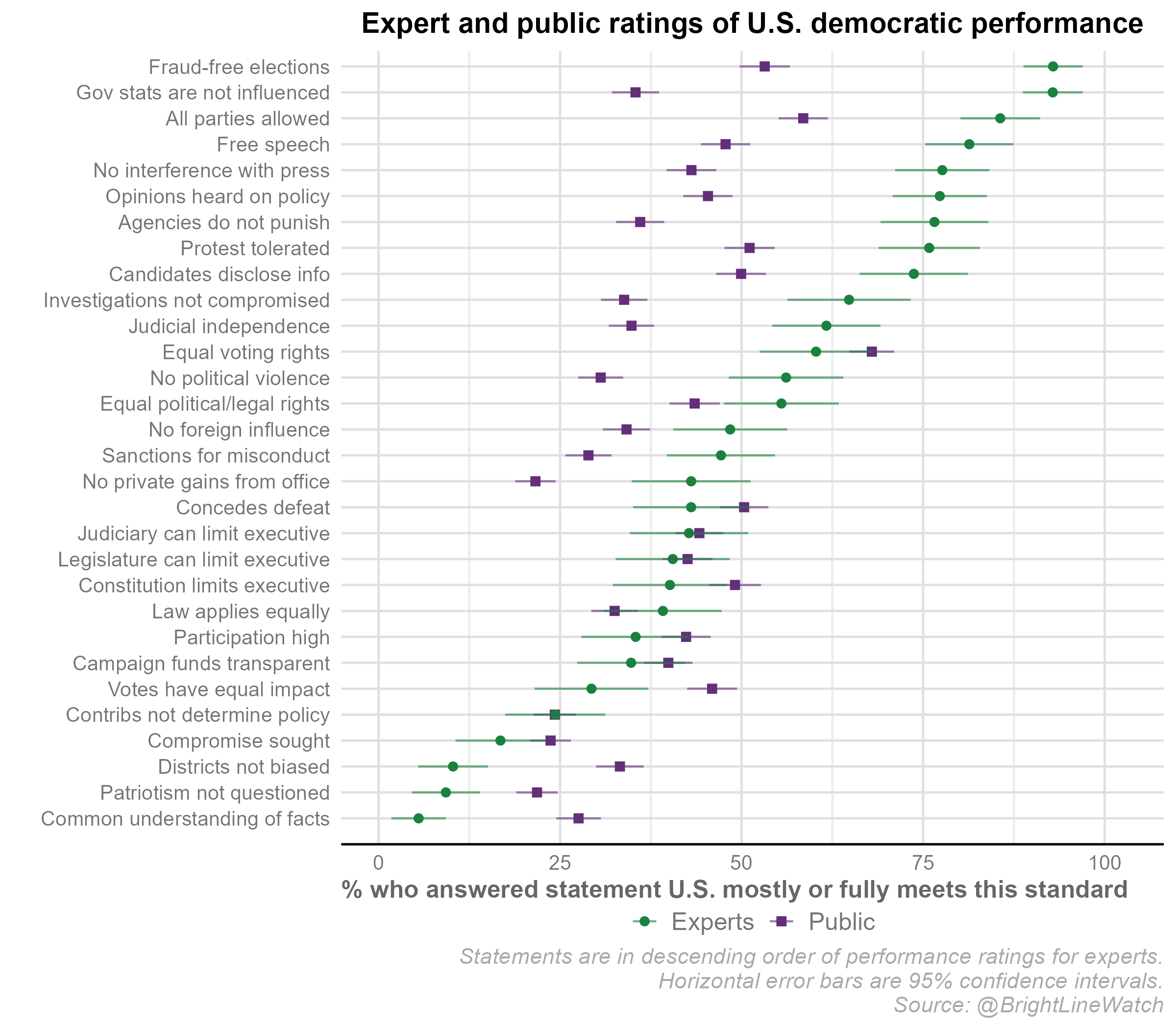
The figure below shows the public ratings of U.S. democratic performance broken out by party.
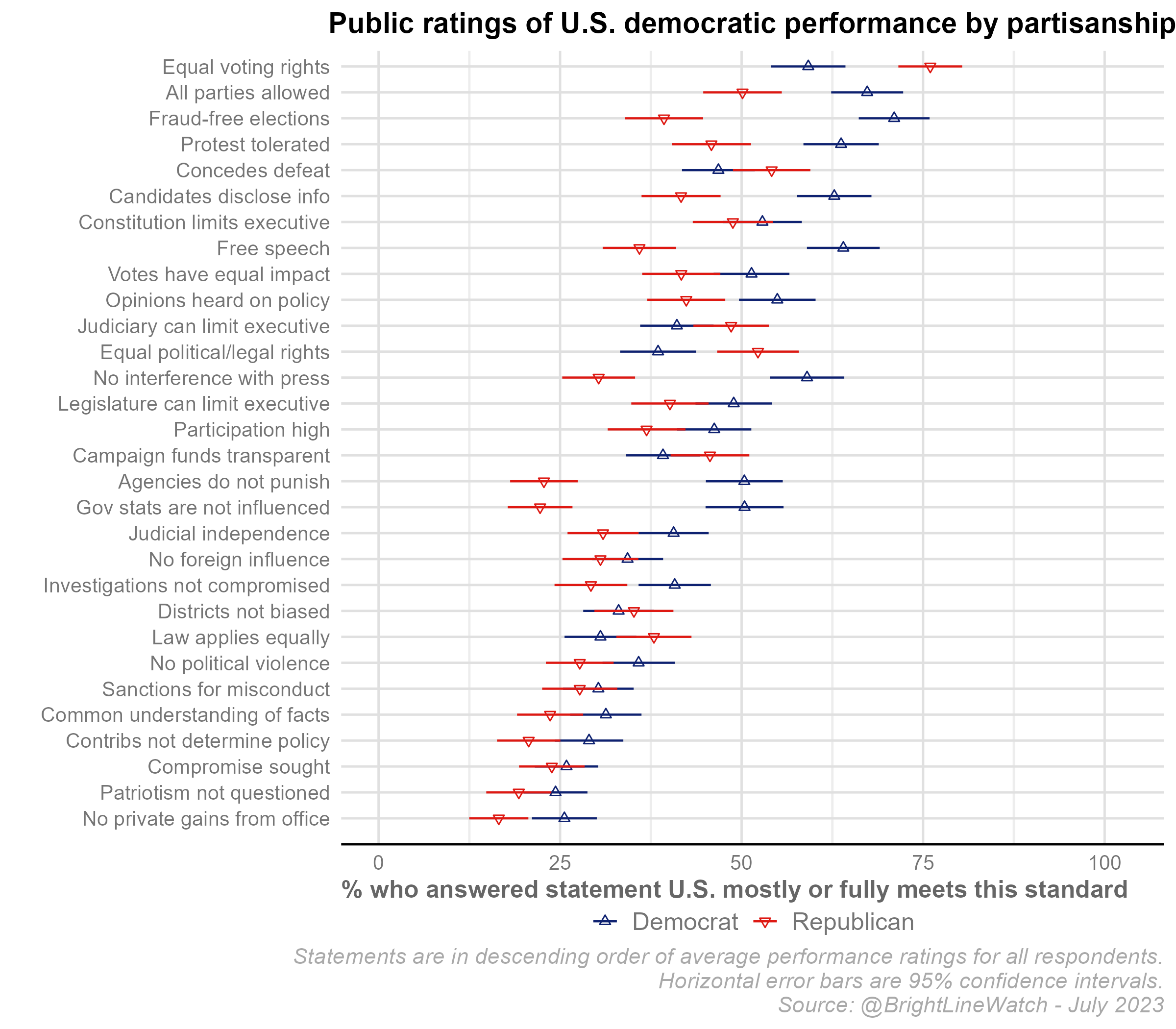
The figure below shows the relative sizes of these two factions within the Republican Party over multiple Bright Line Watch survey waves (October 2022 — October 2024).
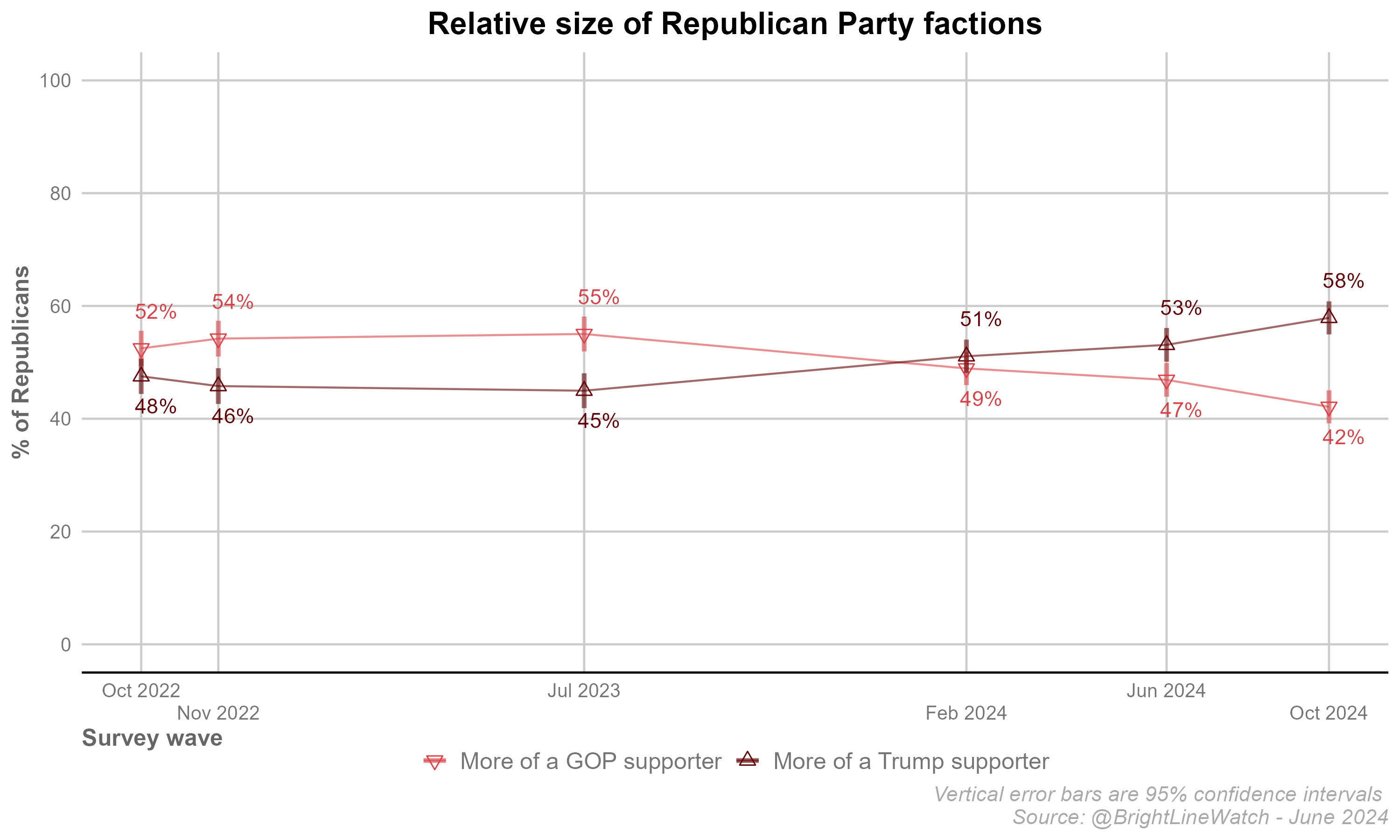
The figure below includes only respondents who answered “Never” to the following question: “We sometimes find people don’t always take surveys seriously, instead providing humorous or insincere responses to questions. How often do you do this?”

The figure below shows how characterizations of the Sept. 15 assassination attempt on former President Donald Trump vary by partisanship.
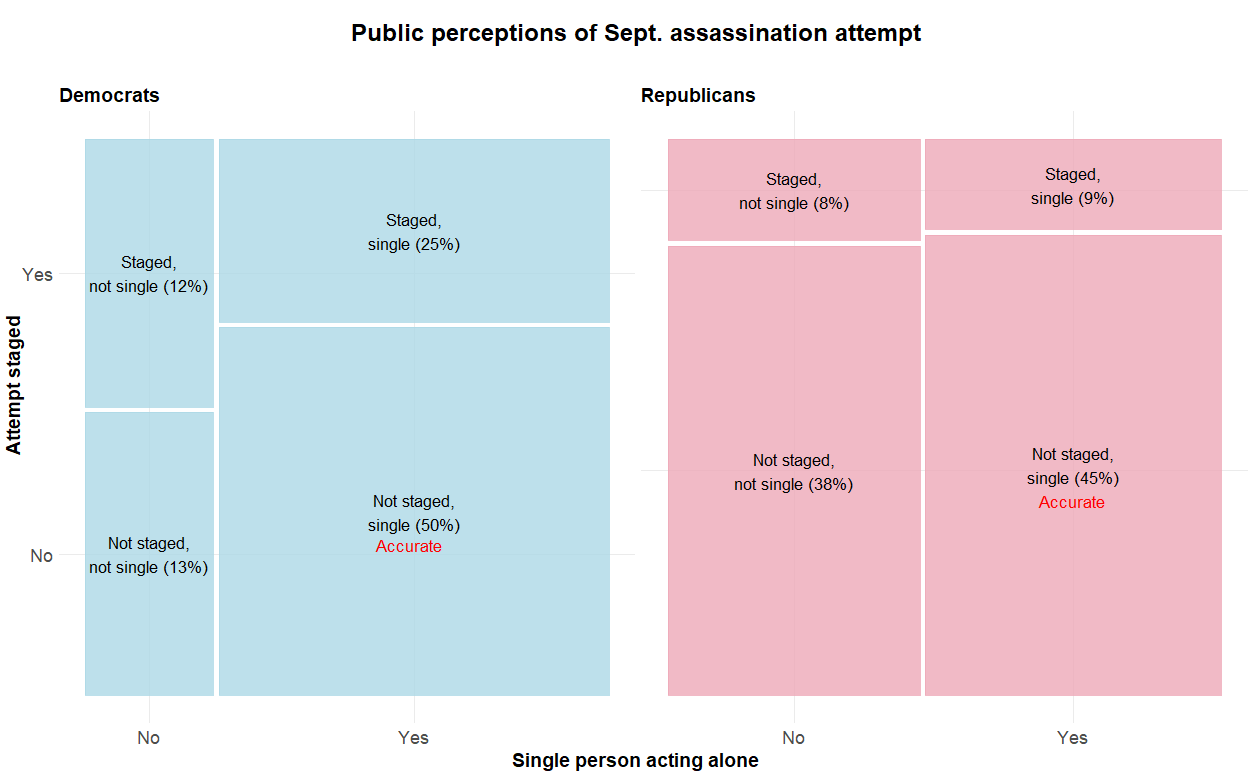
The figures below plot changes in democratic performance on specific principles since our prior survey in June 2024 for experts, the American public as a whole, and Democrats and Republicans separately.

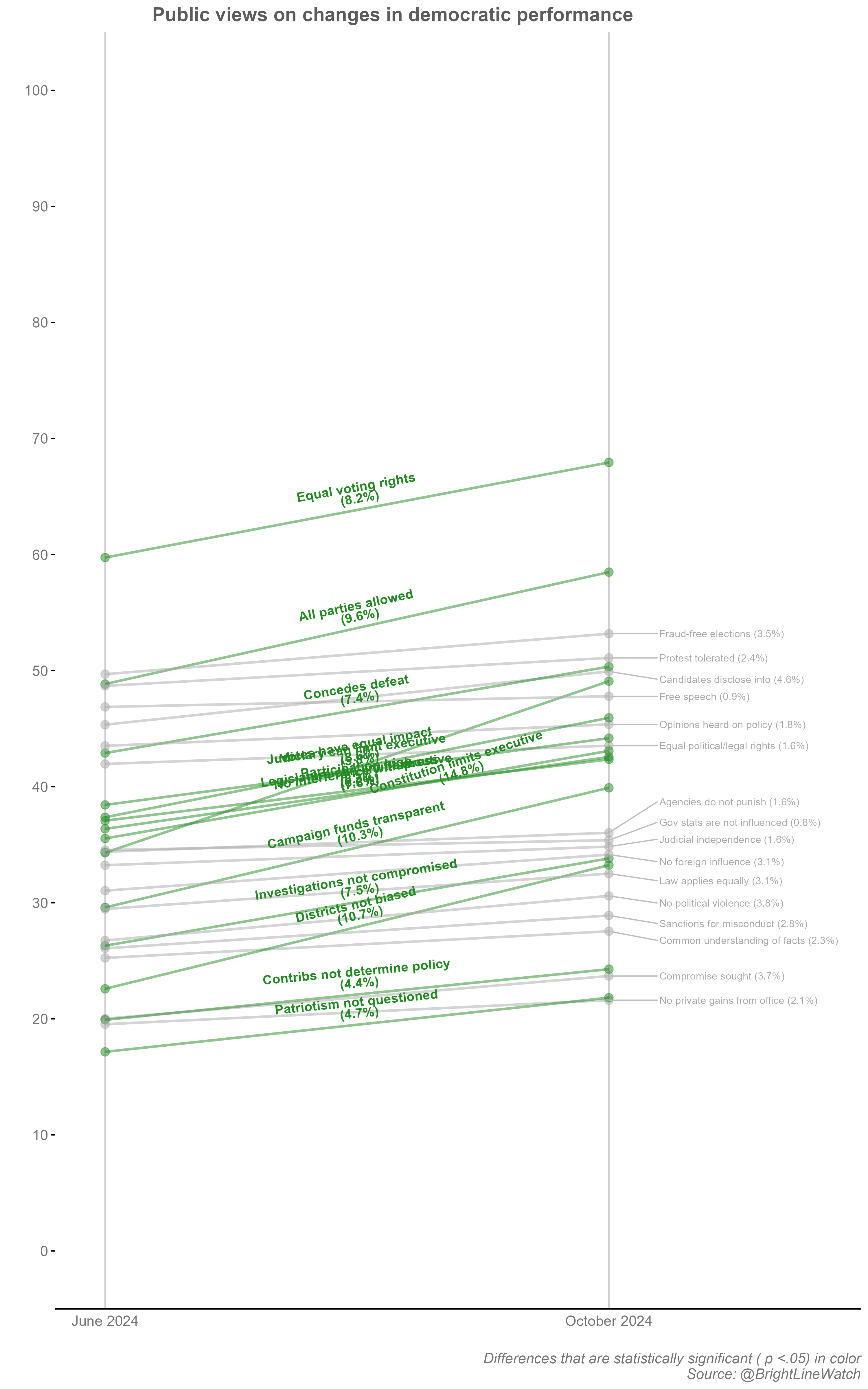
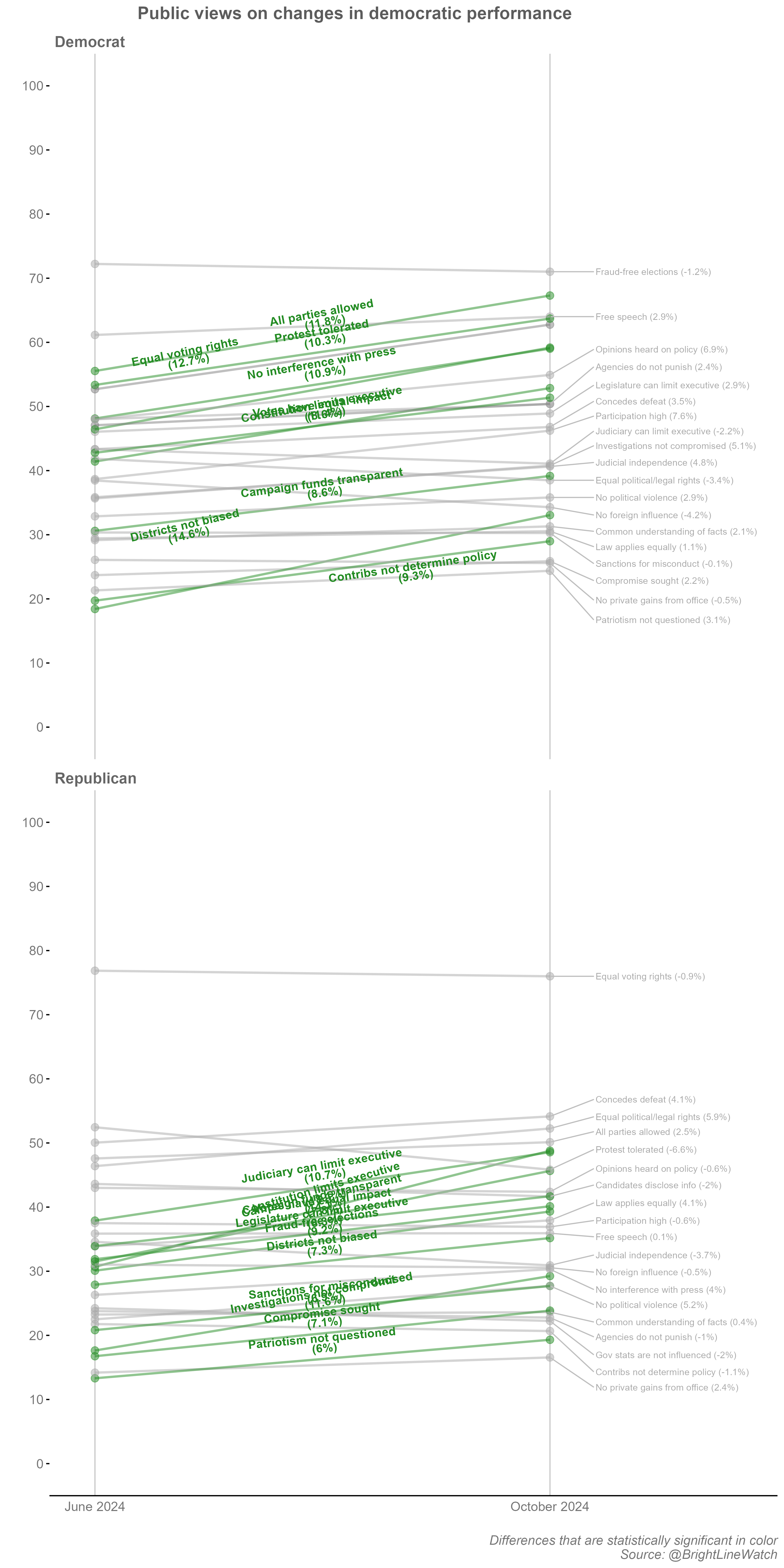
- Given the importance of precisely measuring GOP attitudes on topics such as confidence in elections, the public survey included an oversample of Republicans. It is, however, weighted to be representative of the American public as a whole.
- Due to a survey error, the scale used in this survey differed from the one used in prior surveys (2024: “A million or more,” “A few thousand,” “A few hundred,” “A few dozen,” “Fewer than a dozen,” “Never; 2020/2022: “A million or more,” “Hundreds of thousands,” “Thousands,” “Hundreds,” “Less than a hundred,” “Less than ten”). We compare the proportion of people who said “A few thousand” or more in this survey to the proportion who said “Thousands or more” in the past surveys.
